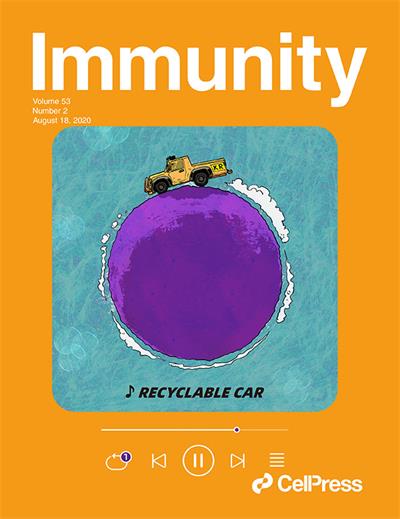Dr. Haopeng Wang’s group at ShanghaiTech University developed a novel CAR-T therapy
Source:Haopeng Wang
2020-09-07
CAR-T therapy is an immunotherapy which using T cells from patients with the expression of chimeric antigen receptor (CAR) to specifically recognize tumor antigens and fight with cancer. CAR-T therapy has produced unprecedented clinical outcomes in B cell malignancies. However, current CAR-T therapy still has some limitations. Recent studies reported that over 30% of B-cell malignancy patients who initially achieved complete remission had relapse of their cancer, and mostly within one year after infusion of their CAR-T cells. A major obstacle to the development of long-term effective of CAR-T therapy is poor T cell persistence after infusion into patients. The in vivo persistence of CAR-T cells significantly correlates with ongoing disease-free survival in both ALL and CLL patients. Therefore, it is important to understand the molecular mechanism(s) controlling the persistence of CAR-T cells.
Recently, Dr. Haopeng Wang’s group and collaborators developed a new “recyclable CAR” which enhanced the in vivo persistence and antitumor function of CAR-T cells. This study was published in Immunity entitled “Chimeric Antigen Receptor Designed to Prevent Ubiquitination and Downregulation Showed Durable Antitumor Efficacy” (cover story). This work is recommended by a number of experts in immunotherapy field, for example, Dr. Hongbo Chi and Dr. Stephen Gottschalk from St Jude Children’s Research Hospital highlighted the study on the Immunity.

In this work, the authors demonstrated that CAR can be ubiquitinated and degraded through lysosome after antigen engagement, which triggers CAR downmodulation. Next, the authors mutated all lysine (K) sites of CAR intracellular domains to arginine (R) to generate a CARKR, which blocked the ubiquitination of CAR and prevented its downmodulation and degradation after antigen engagement. This new type of CAR boosts T cell in vivo persistence and antitumor function. Further exploration revealed that blocking CAR ubiquitination promoted CAR recycling to the cell membrane, and the non-degraded CAR accumulated in endosomes after activation. With the incorporation of 4-1BB motif, the endosomal CAR still bound TRAF2 protein acting as signaling complex propagating signal in cytoplasm. The amplified 4-1BB downstream signal facilitated the metabolic reprograming of the CAR-T cells towards oxidative phosphorylation, which benefited the central memory T cell formation. These results provide a solid rationale to test the new recyclable CAR-T cells in human trials.
Ph.D. candidates Wentao Li and Shizhen Qiu from ShanghaiTech University and Dr. Jian Chen from Fudan University are the co-first authors of this paper. Dr. Haopeng Wang from ShanghaiTech University, Dr. Chenqi Xu from CAS Center for Excellence in Molecular Cell Science, and Dr. Haitao Wu from Eye & ENT Hospital of Fudan University are the co-corresponding authors. This work was support by grants from the National Key R&D Program of China and the National Natural Science Foundation of China.

Links: https://www.sciencedirect.com/science/article/pii/S1074761320303186
Recently, Dr. Haopeng Wang’s group and collaborators developed a new “recyclable CAR” which enhanced the in vivo persistence and antitumor function of CAR-T cells. This study was published in Immunity entitled “Chimeric Antigen Receptor Designed to Prevent Ubiquitination and Downregulation Showed Durable Antitumor Efficacy” (cover story). This work is recommended by a number of experts in immunotherapy field, for example, Dr. Hongbo Chi and Dr. Stephen Gottschalk from St Jude Children’s Research Hospital highlighted the study on the Immunity.

In this work, the authors demonstrated that CAR can be ubiquitinated and degraded through lysosome after antigen engagement, which triggers CAR downmodulation. Next, the authors mutated all lysine (K) sites of CAR intracellular domains to arginine (R) to generate a CARKR, which blocked the ubiquitination of CAR and prevented its downmodulation and degradation after antigen engagement. This new type of CAR boosts T cell in vivo persistence and antitumor function. Further exploration revealed that blocking CAR ubiquitination promoted CAR recycling to the cell membrane, and the non-degraded CAR accumulated in endosomes after activation. With the incorporation of 4-1BB motif, the endosomal CAR still bound TRAF2 protein acting as signaling complex propagating signal in cytoplasm. The amplified 4-1BB downstream signal facilitated the metabolic reprograming of the CAR-T cells towards oxidative phosphorylation, which benefited the central memory T cell formation. These results provide a solid rationale to test the new recyclable CAR-T cells in human trials.
Ph.D. candidates Wentao Li and Shizhen Qiu from ShanghaiTech University and Dr. Jian Chen from Fudan University are the co-first authors of this paper. Dr. Haopeng Wang from ShanghaiTech University, Dr. Chenqi Xu from CAS Center for Excellence in Molecular Cell Science, and Dr. Haitao Wu from Eye & ENT Hospital of Fudan University are the co-corresponding authors. This work was support by grants from the National Key R&D Program of China and the National Natural Science Foundation of China.

Recyclable CAR Efficacy and Mechanism: Recyclable CAR-T cells display superior antitumor function (left); The molecular mechanism of recyclable CAR (right).
Links: https://www.sciencedirect.com/science/article/pii/S1074761320303186


